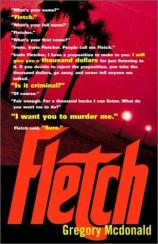Reading Group Guide
Discussion Questions
Fletch

For discussion: Fletch
1 When Alan Stanwyk contracts Fletch to murder him, Mcdonald turns the crime genre on its head by having his hero hired not to solve a crime but to commit one. How does this reversal of convention affect the novel as a whole? How is it ironic that Fletch must solve the very crime he is hired to commit?
2. Unlike Sam Spade and Philip Marlowe, his famous predecessors in the genre, Fletch is not a detective but a journalist. How does this difference affect the way the novel unfolds? What kind of reporter is Fletch? How does he regard his bosses and the newspaper business generally? How does he express his defiance of authority?
3. Fletch is told almost exclusively through dialogue, with very few narrative intrusions, and chapters often begin abruptly in rapid-fire conversation without any clarifying description. What effect does this technique have on the pacing and dramatic tension of the novel? Why has Mcdonald chosen to tell the story in this way?
4. When Fletch sleeps with Alan Stanwyk's wife, she observes, "You two don't look a bit alike. You're blond and he's dark. But actually you're just alike" [p 143]. In what other ways are Fletch and Stanwyk mirror images of each other? In what ways are they different? What are the ironic consequences of their similarities? Why has Mcdonald highlighted these parallels between Stanwyk and Fletch?
5. When Fletch asks Stanwyk how he could justify murdering him, Stanwyk says, "Putting it most simply, Mr. Fletcher, I wanted out." Fletch replies, "Many people do" [p. 188]. How can Fletch relate to Stanwyk's plight? From what do they both wish to escape? Which other characters feel the same need? What means do they use? Is the novel a critique of a society that generates this need to escape?
6. Fletch refuses to wear shoes in the office, defies and insults his bosses, ignores his Bronze Star, evades his ex-wives and his alimony payments, and at one point "belts" three policemen. What is the significance of this defiance of authority? How does it help Fletch solve the mystery?
7. Why has Mcdonald chosen to juxtapose the main plot, Alan Stanwyk's hiring Fletch to murder him, with the subplot involving Fletch's investigation of drugs on the beach? How do these story lines complement each other?
For discussion of Fletch, Confess, Fletch, and Fletch's Fortune:
8. In what ways does Fletch's character evolve over the course of these three novels? How is he different in Fletch's Fortune than he is in Fletch? What traits remain constant in his character?
9. What methods of reasoning and investigation does Fletch employ in these novels to solve each crime? How does Mcdonald manage to keep the reader from knowing more than Fletch does? How surprising is the revelation at the end of each book?
10. Mcdonald has written, "The magic I attempt is to point the finger, as concisely as possible set the scene, then pull back my hand, disappear as the author, leave the reader alone with the characters."2 What is the effect of this kind of writing? Why is it especially useful in the mystery genre? Does this technique require more from the reader than other types of writing?
11. In addition to the narrative pull provided by the suspenseful investigation of a crime, Mcdonald's novels employ a narrative technique common to all great fiction: conflict. With whom or what is Fletch most often in conflict? How do these conflicts affect the reader's relationship both to Fletch and to the novels as a whole?
12. If you have read any of the work of Sir Arthur Conan Doyle, Raymond Chandler, and Dashiell Hammett, how does Fletch compare with other heroes such as Sherlock Holmes, Philip Marlowe, and Sam Spade? In what ways is he both like and unlike his predecessors? How has Mcdonald extended or put his own personal stamp on the mystery genre with the Fletch novels?
Fletch
- Publication Date: March 12, 2002
- Paperback: 208 pages
- Publisher: Vintage
- ISBN-10: 0375713549
- ISBN-13: 9780375713545







